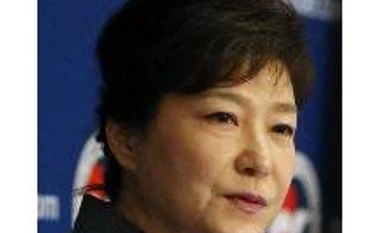South Korean President Park Geun-Hye today said the world needed a tougher response to North Korea's latest nuclear test, as she pledged to push for punitive sanctions against Pyongyang.
Describing last week's test as a gross provocation and an "unacceptable challenge" to global peace and security, Park said it was time to adopt a harsher line with the recalcitrant regime in Pyongyang.
"The international community's countermeasures against North Korea's last nuclear test must differ from the past," Park told an annual press conference.
Her comments came just hours after US lawmakers voted overwhelmingly to impose stricter economic sanctions on North Korea, passing an act that will heap additional financial pressure on the already-sanctioned regime of leader Kim Jong-Un.
North Korea says last week's test was of a miniaturised hydrogen bomb — a claim largely dismissed by experts who argue the yield was far too low for a full-fledged thermonuclear device.
But whatever the nature of the device, it was North Korea's fourth nuclear test since 2006, and further evidence of Pyongyang's intention to continue developing its nuclear weapons capability in the face of international censure.
Describing last week's test as a gross provocation and an "unacceptable challenge" to global peace and security, Park said it was time to adopt a harsher line with the recalcitrant regime in Pyongyang.
"The international community's countermeasures against North Korea's last nuclear test must differ from the past," Park told an annual press conference.
More From This Section
As well as working with the United Nations to adopt the strongest possible resolution to punish North Korea, Seoul would also discuss additional "punitive sanctions" with the United States and its allies, Park said.
Her comments came just hours after US lawmakers voted overwhelmingly to impose stricter economic sanctions on North Korea, passing an act that will heap additional financial pressure on the already-sanctioned regime of leader Kim Jong-Un.
North Korea says last week's test was of a miniaturised hydrogen bomb — a claim largely dismissed by experts who argue the yield was far too low for a full-fledged thermonuclear device.
But whatever the nature of the device, it was North Korea's fourth nuclear test since 2006, and further evidence of Pyongyang's intention to continue developing its nuclear weapons capability in the face of international censure.
)